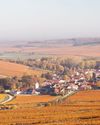
There are already very good Albariños (the name I will use for consistency in this article for the time being) in New Zealand, California, Uruguay and Argentina, and experiments in Australia, Washington and Oregon are showing promise. Bordeaux has even named it as, assesses his pergola-trained Albariño vines as an authorized grape variety – a small revolution, as its adoption marks the first time ever that the Bordelais have allowed a foreign variety in their wines.
This recent success may be a surprise, but it has been a long time coming. Albariño is a noble variety with an extensive history and a distinctive character. Research indicates that it originated in the northwest corner of the Iberian peninsula. As one might expect, the Portuguese and the Spanish don’t agree on exactly where it was born. One reason for this disagreement – aside from the obvious, national pride – is that the variety’s history is so long.
Late arrival
There’s no written evidence of either Alvarinho or Albariño until the 19th century, but there is a demonstrated secular record of high-quality wines in both regions. It is quite likely that these historic wines were field blends which included the variety, as is the case now in Spain’s DO Ribeiro.
Indeed, Albariño performs better in blends in most areas in the Iberian northwest. There are only two zones that specialize in 100% Albariño: the adjacent counties of Melgaço and Monção in Portugal’s DO Vinho Verde, and Val do Salnés in Spain’s DO Rías Baixas.
This story is from the March 2020 edition of Decanter.
Start your 7-day Magzter GOLD free trial to access thousands of curated premium stories, and 9,000+ magazines and newspapers.
Already a subscriber ? Sign In
This story is from the March 2020 edition of Decanter.
Start your 7-day Magzter GOLD free trial to access thousands of curated premium stories, and 9,000+ magazines and newspapers.
Already a subscriber? Sign In

Wine lover's guide to ALSACE
Pretty postcard villages, delicious food, fascinating history and, of course, excellent wines - this beautiful northeastern corner of France has everything a wine lover could ask for

José Pizarro does Christmas Spanish style
In a Decanter exclusive, the celebrated chef offers up an alternative menu for the seasonal celebration

Perfect whiskies for wine lovers at Christmas
What better gift could there be for a wine and whisky lover than a whisky matured in barrels previously used for wine? Our selection of 12 great bottles shows just why it can be a match made in heaven

WHITE CHATEAU
Hitherto a bit-part player, the white wines of this celebrated southern Rhône region are well placed to find themselves increasingly in the spotlight, as a result of the changing climate conditions. Our Rhône expert recommends 20 of his favourite examples to seek out

Chablis 2023
Variable weather made it challenging at times, but a late hot spell came to the rescue, resulting in plenty of good wines for drinking and for keeping. Having tasted almost 400 Chablis 2023 wines, our expert selects 30 of his favourites, along with five from top producers in neighbouring crus

Looking BACK, looking AHEAD
As 2024 draws to a close, we asked eight of our regular contributors to nominate their most memorable wine experiences of the year and to reveal what they're anticipating most in their plans for 2025

25 TOP SYRAH/SHIRAZ REDS
Two names, a multitude of personalities. For almost two centuries, Syrah has been woven into the fabric of the southern hemisphere's wine world. Today, it makes some of the most exciting and terroir-expressive wines to be found south of equator, with a growing shift towards single-site bottlings

A Resource for the World? - Argentina is unique in the genetic diversity preserved in much of its vine material. With climate change and disease posing increasing threats worldwide, Catena Zapata winery is asking what lessons can be learned to protect vineyards within and beyond the nation's borders
Argentina is unique in the genetic diversity preserved in much of its vine material. With climate change and disease posing increasing threats worldwide, Catena Zapata winery is asking what lessons can be learned to protect vineyards within and beyond the nation’s borders

Great Cabernets of South America
Other varieties may hog the limelight across South America, but the world’s most popular grape for red wines has played a critical role in the continent's wine heritage. We trace Cabernet Sauvignon’s story here, and recommend 16 benchmark wines to try

PROVENCE by train and bike
With rail links to Paris, Nice, Marseilles and beyond, a vast network of cycle paths and quiet roads, and a plethora of historic wine estates, Provence is an ideal destination for an eco-friendly, car-free and carefree) holiday